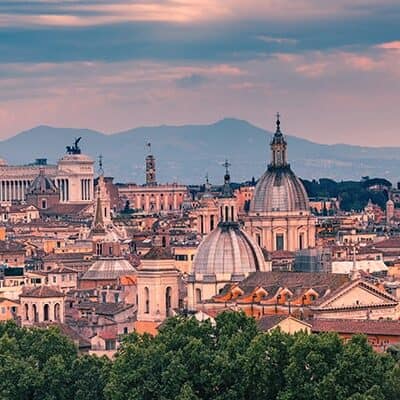The electorate of the United States, fed up with the status quo, delivered a stunning result this November 5th. On its face it was a rebuttal of “business as usual,” of a stagnant economy, of rising prices and uninspiring leadership (to say the least).
However, some of us hope it was something more than that. We hope it reflected a deeper dissatisfaction over issues that bear on the morality of the nation as a whole. If it was merely a self interested reaction to diminished prosperity, it will not be enough. Some reprise or economic boost resulting from policy changes may occur, but the true turn around necessary to heal this country will remain out of reach.
For that, there is only one path forward. It is almost cliché to repeat but as relevant as ever, “If my people, which are called by my name, shall humble themselves, and pray, and seek my face, and turn from their wicked ways; then will I hear from heaven, and will forgive their sin, and will heal their land” (2 Chron. 7:14).
Hopefully, there has been a great deal of that in our nation. While there is no remedy outside of repentance for a corrupt and morally bankrupt population, only God can truly know when things have reached the tipping point from which there is no return. The Bible provides true solutions as well as examples of how nations have changed for the better.
The economy and inflation polled near the top of voter’s concerns. What are some rules scripture lays down for these issues? “The rich rules over the poor, and the borrower is servant to the lender” (Prov. 22:7). This scripture proves itself true in more ways than one. The wealthy often enjoy undue influence, though this role encompasses some unique pitfalls as well (Matt. 19:23-24).
More to the point, for our nation as a whole, may be the warning over our burgeoning debt. Virtually no steps have been taken to get it in check heretofore. Should efficiency and budget remedies prove effective, we may be fortunate enough to avoid the kind of drastic interventions that have been necessary to put Argentina back on the path to solvency. We certainly do not want to wait until we are suffering from triple digit inflation before tackling the problem.
How about honesty and accountability from those who hold high office? “You shall appoint judges and officers in all your gates, which the Lord your God gives you, according to your tribes, and they shall judge the people with just judgment. You shall not pervert justice; you shall not show partiality, nor take a bribe, for a bribe blinds the eyes of the wise and twists the words of the righteous. You shall follow what is altogether just, that you may live and inherit the land which the Lord your God is giving you” (Deut. 16:18-20).
This scripture speaks volumes. Its context, after a recap of God’s Holy Days and before a reminder regarding idolatry, shows its importance. No society can thrive while burdened with self-seeking leadership. Corruption is a scourge and you can see its detrimental influence on businesses and organizations of all types and sizes. Unfortunately, it is almost taken for granted that our elected officials deal out favors to their friends and families. The lobbies with the deepest pockets receive the most consideration when it comes to regulation or government contracts. Such practices should not be taken for granted. They are a sin against God Almighty!
The audacity goes further. “Then Jesus spoke to the multitudes and to His disciples, saying: ‘The scribes and the Pharisees sit in Moses’ seat. Therefore whatever they tell you to observe, that observe and do, but do not do according to their works; for they say, and do not do. For they bind heavy burdens, hard to bear, and lay them on men’s shoulders; but they themselves will not move them with one of their fingers’” (Matt. 23:1-4).
There is an interesting and observable shift in opinion on certain issues when you compare the average citizen to the elites or the ruling class. There is a notable divergence on topics like climate change, where the kind of radical government interventions proposed to address it would substantially increase the cost of living. The truly wealthy are not affected in the same manner when the cost of living goes up.
A similar point could be made about the tax code. It is complicated to the point of absurdity. Those who can afford teams of lawyers and accountants are able to take advantage of the many loopholes built into the system and often end up paying very little. The average citizen muddles their way through the forms, pays whatever it says, and hopes that is the last they will hear of it. With all the heated rhetoric about people paying their “fair share,” it is a wonder the nation does not turn to a flat tax, similar to the system of tithing in the Bible. Alas, the tangle exists for the benefit of those with a vested interest in its continued complexity.
On the other end of the spectrum, welfare can be a touchy subject. “For even when we were with you, we commanded you this: If anyone will not work, neither shall he eat. For we hear that there are some who walk among you in a disorderly manner, not working at all, but are busybodies. Now those who are such we command and exhort through our Lord Jesus Christ that they work in quietness and eat their own bread” (2 Thessalonians 3:10-12).
Care for the poor is a necessity. It is emphasized in both the Old and New Testaments. We cannot lose our compassion and pretend to be righteous. But, as Paul is stressing in this scripture, there is a potential for abuse which should not be tolerated. As a nation we need a safety net. Tragedies occur, people fall on hard times, and having a system in place to alleviate hardship and suffering is appropriate and Godly. For the sake of everyone involved it cannot be allowed to become a scam.
Needed resources are wasted, the character of those who take unnecessarily suffers and as confidence in the system is lost compassion wanes. Society runs the risk of becoming hard-hearted towards the truly unfortunate. This worsens when the system is further exploited as a tool for influence.
Like many other problems and sins we struggle with, no amount of enforcement can prevent abuse. Maybe you have had similar experiences… I have been approached by someone who wanted to sell me their food stamps. I have worked with someone who deliberately worked part time for minimum wage while having more children to increase their benefits. Direct quote, “I’m going to eat steak every day.” I have more COVID examples than space allows. Many were forced out of work, their employers shuttered, and were truly in need of relief. Others double dipped or elected to go on an extended vacation. It takes character and integrity on all sides to maintain a system that is beneficial, generous, and sustainable.
Promises made sometimes overlook a nation’s ability to make good on them. Argentina has been making a painful correction. Many subsidies and price controls that people relied upon have been taken away. Yet this became absolutely necessary after consecutive years of triple digit inflation. Despite the pain, President Milei has retained his popularity and many trust him to stay the course and fix their economy in spite of the temporary hardships.
Would that these sorts of corrections could be made before disaster actually strikes. Many African nations are grappling with fuel and electric subsidies they cannot afford, and yet cannot remove without plunging their cities into chaos. Nor are “1st world nations” immune from these kinds of problems.
Spain is taking an opposite tack to its European peers by legalizing 300,000 undocumented migrants a year. Their leftist government believes there is no other way to plug employment shortfalls and generate the tax revenue necessary to maintain their social safety net with an aging population and dismal demographic projections.
France’s government is collapsing. Budget wrangling is at the heart of it, with demands for pension increases, protection for medical subsidies and a freeze on certain tax increases as the sticking points, despite a 6% deficit. At the same time, European Central Bank President Christine Lagarde has categorically stated that current social models will crash without drastic changes taking place. The same population growth issues have caused production to lag while requiring more spending for retirement as well as programs to try to encourage the young to have more children.
Across the board it is more spending with less revenue. At some point the financial reality is going to become the overriding issue though attempts at correction, like raising the retirement age to reflect modern life expectancy, are met with tremendous push-back.
These may all seem like like physical, temporal problems of administration. But they are indicative of deep seated spiritual issues in society. As a whole, we cannot thrive if we are all self-seeking and self-interested. As with our more obvious struggles to control theft, dishonesty and covetousness, we wound ourselves when we abandon efforts to keep them in check. There must be return to personal responsibility and morality or none of our problems will be fixed. This is true of the population in general but its effect is amplified in leadership. And when problems exist at the highest levels, there is no other plane on which they may be corrected.
The blessings of a happy and prosperous society do not exist apart from God. They are a gift. But we have been blessed with a great deal of knowledge and instruction to illuminate both why things go awry and how they can be corrected. The history of the Bible provides us with examples of how a nation can be restored and rejuvenated.
When King Hezekiah came to power, Judah had been subjugated by Assyria. 2 Kings 18:3-4 says, “he did what was right in the sight of the Lord, according to all that his father David had done. He removed the high places and broke the sacred pillars, cut down the wooden image…” and verses 6-7, “For he held fast to the Lord; he did not depart from following Him, but kept His commandments, which the Lord had commanded Moses. The Lord was with him; he prospered wherever he went. And he rebelled against the king of Assyria and did not serve him.”
While he did end up having to pay tribute to Assyria, Judah was not carried off in the same manner as Israel. Hezekiah humbled himself and entreated God (2 Kings 19). Internal strife derailed Assyria’s plans and left Judah intact. Hezekiah’s own life was extended by a similarly merciful answer to a humble petition. God can heal, He can protect or delay, even if the end result is inevitable.
Notice an interesting scripture in 2 Kings 20:16-19, “Then Isaiah said to Hezekiah, ‘Hear the word of the Lord: “Behold, the days are coming when all that is in your house, and what your fathers have accumulated until this day, shall be carried to Babylon; nothing shall be left,” says the Lord. “And they shall take away some of your sons who will descend from you, whom you will beget; and they shall be eunuchs in the palace of the king of Babylon.”’ So Hezekiah said to Isaiah, ‘The word of the Lord which you have spoken is good!’ For he said, ‘Will there not be peace and truth at least in my days?’”
It is an odd sentiment, but those who know the truth face a similar conundrum. We know that there are many end-time prophecies that do not bode well for our nation. It is not called the “time of Jacob’s trouble” for nothing. The church has striven to warn of the prophecies contained in Ezekiel, Isaiah, Jeremiah and others as well as New Testament reiterations from the book of Revelation, the writings of Paul and the words of Christ Himself!
The end is decided. All we can hope for is a reprise like that granted to Hezekiah. Yet that is no small thing! Under his leadership evil practices that are repugnant to God were put away. How many thousands or millions benefited from this revival? How many were allowed to live, thrive and potentially come to repentance while these wicked influences were kept at bay? It was a tremendous opportunity.
Applying this lesson to our own time, we might ask ourselves which course of action God would find preferable: rolling over in defeat and contenting ourselves with self righteousness or striving with all the strength He gives us to resist what is destroying us and to establish truth and justice?
Hezekiah’s reign lasted 27 years. Afterwards, his son Manasseh took the throne and ruled for 55 years. His tenure is stated to be the worst ever, flooding the nation with idolatrous depravity and debauchery. He was succeeded by Amon, who continued in the same vein but reigned only 2 years. Then, a major change took place.
Josiah came to power at the tender age of 8. Unlike his predecessors, “he did what was right in the sight of the Lord, and walked in all the ways of his father David; he did not turn aside to the right hand or to the left” (2 Kings 22:2). Eighteen years into his reign, the Book of the Law was found. It is remarkable to consider that it had ever been lost! The King asked for it to be read to him, and the effect upon the young monarch was profound. He was devastated at the sins they had been committing and the punishment it would inevitably bring. When he inquired of the Lord, he was given a promise similar to that of Hezekiah; wrath was surely coming, but because he had humbled himself it would not happen during his lifetime.
The young king did not sit idle (no pun intended). He actively rededicated the nation to God, bringing it back into sync with God’s laws and removing all of the idolatrous practices from the land. The whole episode is recorded in 2 Kings 23 and is well worth reading.
As an interesting aside, verse 13 mentions altars that Solomon had built to the gods of his wives such as Ashtoreth. These apparently survived the previous reformation of Hezekiah. In a strange way, this may be some small consolation for our nation today. God willing, we will make many changes to realign our country with the laws of truth and justice. But abolishing certain practices (like many of the holidays based on these same pagan deities that have been re-branded as “Christian”) or other sins that have become entrenched, is simply not going to happen. Still, we have the record of God honoring Hezekiah’s efforts and delaying His wrath even though the nation was not “perfect” by any means.
This entire period, from Hezekiah to Josiah, is worth consideration when we ponder the potential for a national revival. Lasting over 100 years all together, we get a bird’s eye view of reform followed by decay, more reform and then the inevitable destruction. After Josiah’s death, it was the end of Judah’s independence. The nation plunged right back into the very sins he had expunged from the land. They were subjugated by Egypt, and in barely over a decade they were captured by Babylon.
This was just as God had indicated it would be, but in each instance His people returned to Him they were granted a temporary reprive. What Josiah achieved may have been the last gasp of a dying nation but it was a noble and a worthy effort. Think of it in real human terms. Think of 31 years where evil is held at bay and the tremendous alleviation in real human suffering.
Repentance and reconciliation are available if we can only muster the collective humility and fortitude to take hold of it. God has promised. He has preserved the truth, His law, and a multitude of historical examples to show us how it can happen and prove that it is possible. The United States of America needs a true, spiritual revival. Economics is not enough. Regaining prestige is not enough. Healing and realignment with God must take place on a personal level and throughout the institutions we all share. Freedom cannot be a cloak for evil. Power must be used for good, and not for ego or personal enrichment. We pray that is the kind of change the people of this nation desire.
In the end, the question is not “Can we fix it?” but “Will we fix it in time?” At some point there will be no turning back. As the wrath of God waited until the “abominations were full” before establishing Israel in the promised land, so we may have a chance to change course before it is too late. As He delayed punishment in the lifetimes of Hezekiah and Josiah, it is possible to receive a reprise. A chance for true, national repentance!










